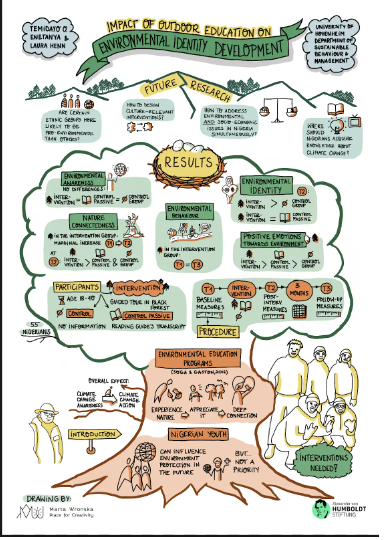Aligned with the United Nations Sustainable Development Goal 13: Climate Action, which urges global action against climate change, this study tackles the urgent environmental challenges facing Nigeria. Like many countries worldwide, Nigeria confronts issues such as deforestation, pollution, and biodiversity loss, which have far-reaching impacts on public health, climate stability, economic resilience, and ecosystem health. The engagement and empowerment of young people are seen as vital to confronting these challenges and championing environmental sustainability. However, involving Nigerian youth in environmental initiatives faces hurdles, including limited awareness, competing priorities, and skepticism—often due to restricted access to accurate information and longstanding cultural beliefs.
To overcome skepticism among Nigerian youth, a blend of education, awareness, and community engagement is essential. Research underscores the value of environmental education in raising awareness and fostering understanding, with outdoor programs proving particularly effective in building a strong connection to nature, promoting environmental stewardship, and enhancing personal environmental identity.
Building on this, the present study explores the effectiveness of outdoor environmental education programs for Nigerian youth. By examining how these programs influence participants' connectedness to nature and environmental identity, the research seeks to uncover practical and scalable methods to foster environmental awareness and engagement. The study addresses two central questions: first, can participation in an outdoor Environmental Education Program strengthen connectedness to nature, and second, how does this connectedness impact participants' environmental identity?
The study involves 55 Nigerian participants aged 18-40, residing in Germany, with 15 forming the intervention group in an instructor-led excursion to the Black Forest. The remaining participants served as control groups: one received the same information in written form (n = 20), while the other received no intervention, completing only questionnaires (n = 20). Participants were recruited from various Nigerian regions and German cities through a snowball sampling method, with intervention group members compensated €20 for the 1-day excursion. Data collection occurred at three stages: before the intervention (T1), immediately after (T2), and three months later (T3). Questionnaires collected data on demographics, environmental awareness, and behavior at T1 and T3, while environmental identity data were gathered at T1, T2, and T3. Participants' emotional responses (positive and negative affect) were measured at T2, with options to complete questionnaires electronically or in person.
To assess environmental identity, the "Revised Environmental Identity (EID) Scale" by Clayton (2021) was used, focusing on individuals’ connection to environmental issues and values. Environmental awareness was measured with items from the "New Environmental Paradigm Scale" (NEP) by Dunlap et al. (2000), which emphasizes beliefs on humanity’s relationship with the environment. Pro-environmental behavior was evaluated using the "Pro-Environmental Behavior Scale" by Steg and Vlek (2009), capturing the frequency and depth of environmentally beneficial actions. All ethical protocols were followed, ensuring confidentiality and informed consent.
Results showed modest changes in environmental identity within the intervention group, though no sustained effects were evident at the three-month follow-up. Positive affect notably increased in the intervention group immediately following the excursion, suggesting a positive emotional shift in participants’ environmental perceptions. However, significant behavior changes were not observed across the three assessment points.
Despite limited long-term effects, the intervention highlights the potential of experiential outdoor education to nurture a generation of environmentally conscious individuals, ready to address Nigeria's critical environmental issues and advocate for sustainable development.
Article | Research Details
- Home /
- Article | Research Details


Clayton, S. (2021). Revised Environmental Identity (EID) Scale. The scale assesses individuals' connection to the environment and identification with environmental issues and values. Further details can be found in Environmental Identity: A Conceptual and Operational Definition within environmental psychology literature.
Dunlap, R. E., Van Liere, K. D., Mertig, A. G., & Jones, R. E. (2000). Measuring Endorsement of the New Ecological Paradigm: A Revised NEP Scale. Journal of Social Issues, 56(3), 425–442. This scale is widely used to assess individuals' environmental attitudes and beliefs regarding humanity’s relationship with the environment.
Steg, L., & Vlek, C. (2009). Encouraging Pro-Environmental Behavior: An Integrative Review and Research Agenda. Journal of Environmental Psychology, 29(3), 309–317. This work provides an integrative review of factors influencing pro-environmental behaviors and includes the Pro-Environmental Behavior Scale used in the study to gauge participants' environmentally beneficial actions.